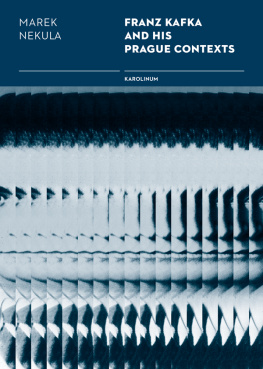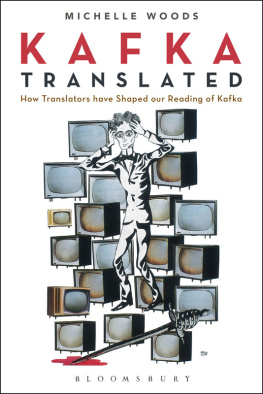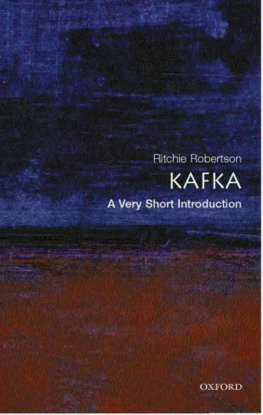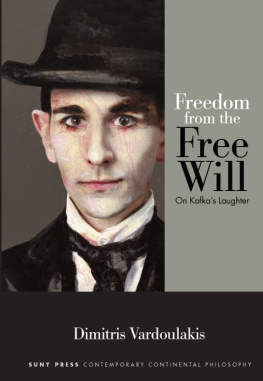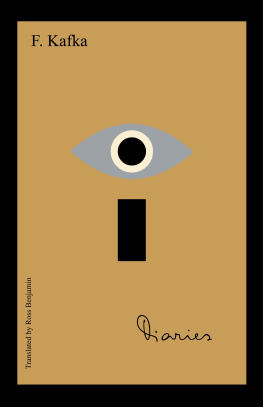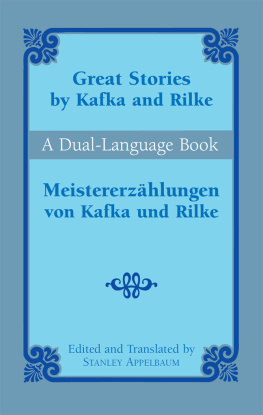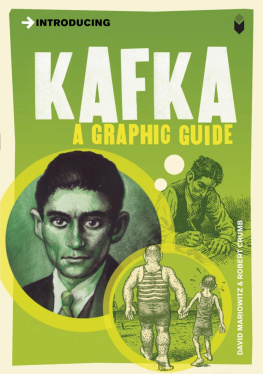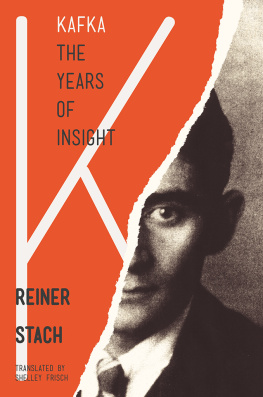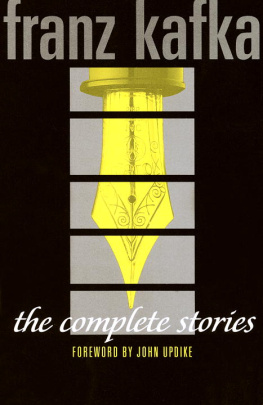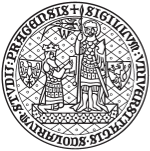FOREWORD
It is now taken for granted that Franz Kafka has become one of the most published German-language writers, that he is a world literary figure, that his fragmentary texts with their polyphony and rich ambiguity exemplify the procedures of literary modernism, and that his writings address the key questions of the modern age. There are several editions of his complete works in German alone, while the critical edition strives to reconstruct faithfully the genesis of his texts and their variants, elucidating the contexts from which they emerged in exhaustive commentaries. Besides Kafkas literary works, diaries and letters, the critical edition also includes the letters he received. Even the correspondence and official reports he wrote or may have written at work, whether alone or as co-author, have been published and annotated. And alongside the constant flow of new studies analysing his literary works from various angles, there has been (and continues to be) a plethora of specialized studies and monographs concerning the books Kafka possessed or read, the films he saw, the family he was born into, the women he knew, the sanatoria he was treated in, the pubs he frequented, and the factories he had dealings with in his work.
Yet paradoxically, given this flood of secondary literature relating to Kafkas life and work, authors seeking a new perspective increasingly do not take for granted that he can be written about. The question: What should a new study of Kafka be about? thus becomes: Can it in fact say anything new about him? Does it serve any purpose? Moreover, by devoting so much attention to Kafka do we not displace other writers to the periphery and distort our perception of the literary field of the time? These questions are of particular relevance for this collection of Kafka studies initiated by the Karolinum Press, which I have called Franz Kafka and His Prague Contexts.
After all, Kafka and Prague is hardly an original subject. Indeed, the conjunction is so obvious that it has prompted many efforts to ground the writer in his home city and interpret him from the Prague perspective. After the years of Czechoslovak socialist realism in the 1950s, when the supposedly decadent Kafka had been considered taboo, Germanists in Czechoslovakia began to appropriate him on the evidence of his family background and topographical links with Prague.
What is new in my book, I believe, is its critical view of the apparent self-evidence of such appropriation. That is why it opens with the essay Suppression and distortion: Franz Kafka from the Prague perspective, which challenges the self-evidence of the biography- and sociology-based view of Kafka associated with the Liblice conference which, with its over-simplified data, research interests and interpretations of Kafkas texts, persists in some studies of Kafka to this day. As the 2008 conference Kafka and Power 1963 1968 2008 and studies by Vladimir V. Kusin and Michal Reiman have reminded us, the Liblice conference was more significant from the point of view of cultural policy than of literary studies. The part played by Liblice in shaping readings of Kafka in the wider context of his reception has been examined by Veronika Tuckerov. In this regard, my study focuses on the role of Kafkas family language in interpretations of his work from the Prague perspective and on the resulting distortion of authentic readings of Kafkas Czech texts that helped sustain the Prague interpretation. This view relied less on his texts and more on external sources, including the testimony, not always genuine, of contemporaries who knew him or met him. At the time of the Liblice conference Kafka still was a part of communicative memory and thus fell victim to the self-interest of story-tellers such as Gustav Janouch and Michal Mare.
The opening study in the present volume, first published in 2014 in Franz Kafka Wirkung, Wirkungsverhinderung (Franz Kafka Reception and Reception Blocks), has two aims. The first is to demonstrate how an ideology-driven approach to Kafka led to the distorting of the authentic shape of Kafkas language in his texts and thus to the reinforcing of a particular interpretation of his literary works. The second is to exemplify the approach I have adopted in the other studies in this collection and which gives the book its unity although these are concerned with linguistic as well as literary issues. The other studies, too, address questions that may be considered self-evident or already settled, challenging, for instance, the widely accepted myth of Prague German and its supposed influence on Kafkas literary style, or revisiting the seemingly obvious question of Kafkas natural (organic) language to which the answer is in fact far from obvious. Studies of the form of language used in Kafkas texts go back wherever possible to the authentic versions of his texts with their unretouched idiosyncrasies, mutations and multiple corrections and variants. The present studies contextualize these idiosyncrasies, whereby their author is the first to admit that their sources and interpretations, given Kafkas social milieu and the linguistic situation in his day, may be multifarious. The studies of the literary texts, in turn, go back to a close reading of the actual text not in an attempt to imprison it in one of its possible readings, as was proposed by Marxist scholars with their Prague perspective, but to uncover in a wide reading the polysemy ofKafkas texts and the plurality of their readings, out of and into which lead textual threads that connect them with the literary and public discourse of the period. While the opening chapter offers an external outline of Kafkas identity in German Studies, the essays that follow look at the discursive negotiation of that identity (or identities) from within his literary and non-literary texts. These are read, in the modus of New Historicism, in contrast not only with each other but, in the context of contemporary discourses, with other, non-literary texts. Overall, my intention in these studies is to extricate Kafka from the one-sidedness of partisan interpretations, which tended from the outset to marginalize other perspectives and approaches to Kafka within German Studies and ignore the relevance of other literary and public discourses that he if we are to believe Julie Kristevas dictum that writing is a re-reading of other texts assimilated both as reader and author. Such narrowness distorted not only the polyphony of Kafkas texts but the way we view the literary field in which he was active.
Thematically, this collection of my studies is devoted to the actual language of Kafkas texts as well as the fictive languages we encounter within his literary works such as those spoken by the builders of the Tower of Babel, or by the nomads who chatter like jackdaws taking into account the prevalent language situation, the function of language(s) in the public space, and contemporary discourse on the language question. I have adapted these studies so that they form chapters of a book that I hope is coherent in both form and content. Partly, I take up themes discussed in my 2003 monograph

